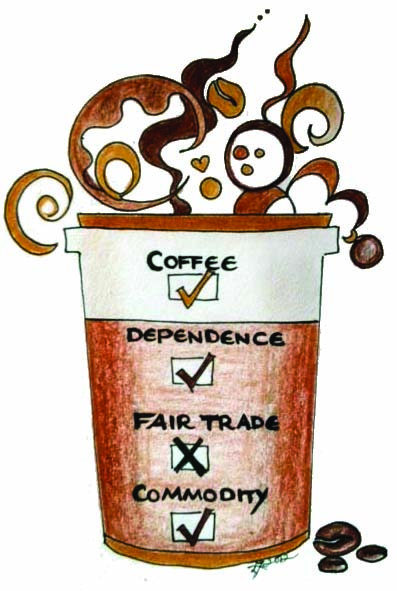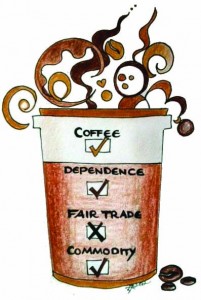More than just a morning fix


What better way to get started in the morning than by simply pouring hot water over ground coffee beans, grown in those sun-drenched, tropical highlands? The seductive smell of that innocent cup of coffee, involves you and me in a web spun by a highly lucrative, international commodity. By volume, coffee is second only to oil as a commodity in international trade, as nearly 75 per cent of all coffee produced moves from one country to another.
With a Tim Horton’s on virtually every corner, and an addict in every home, Canada is among the top destinations of the coffee beans produced in the world. Coffee is a very big business. What is problematic about the way coffee is financed is that 9/10ths of the price we pay towards one cup goes to the powerful companies like General Foods, Kraft and Nestle, which ship, roast and retail the product. A mere 1/20 reaches the people whose laboring lives are spent actually growing and harvesting the coffee we so often take for granted.
In the United States the demand for coffee grew significantly after the Boston Tea Party. When those upstart colonials protested “No taxation without representation,” and threw British tea into the Boston harbor, drinking coffee became a patriotic duty. Some social critics, looking at our compulsive caffeine need at breakfast, argue that perhaps it means today that we “break-fast” out of our starting blocks and into the hurried, frenetic treadmill of life. Coffee is that much needed stimulant.
A single cup of coffee contains a solid dollop of caffeine, anywhere from 50-180 milligrams. That caffeine dilates blood vessels, supplies the brain with oxygen, stimulates neurons in the cortex, fires up gastric glands, speeds intestinal movement and increases cardiovascular output. No wonder Tim’s drive-thru has become traffic problems as cars desperately pile up to the take-out window to get their fix. With the many generous side-effects of caffeine, it is easy to see why a cup of coffee has become a critical component of Canadian drug culture.
Coffee is a performance drug with wide social approval and yet, still widely used. Similarly, it fits well with our obsession to out-achieve others. Coffee conditions us for the rat race that lies ahead each work day. It truly is a rat-race for our numerous cups of coffee to come during our much needed morning “coffee breaks.” These coffee breaks allow us time to meet our co-workers as human beings, not as cogs in a gigantic assembly-line or corporate gear-box. Here we can discuss and reveal the human dimensions of our often tedious jobs.
Remember, too, the “koffee klatsch;” a gathering of neighbors on the block, a place where neighborhood gossip is shared. Even more important, according to Sara Ruddick, such a meeting was a place for “maternal thinking”, in which conversations about the joys and sorrows, frustrations and fine moments of parenting, reinforced the community’s values of care, nurturing, and training. With both mom and dad at work today, the neighborhood “koffee klatsch” is an endangered species.
Coffee has also been associated with cerebral activities, the intellectual life and even, heaven forbid, with university professors. Remember the intellectual roots of the great smoke-filled, coffee houses of Paris, Berlin or Prague where anarchy was whispered and revolution planned. All the subversive sub-cultures of the world came together in those coffee houses. Such café societies worried those committed to the status quo;. For example, French philosopher Montesquieu complained, “Were I the King, I would close the cafes, for the people who frequent those places heat their brains in a very tiresome manner.” So let us all hail “coffee time”.
Our lives are fragmented and scattered in many ways and coffee brings us together once more; a community countering the loneliness and isolation we may feel. While there are relevant problems that need to be dealt with around the business of coffee, it has historically and presently been a source for human connectivity. So the next time you reach for your fix, just ensure it is both fair trade and being consumed to relax rather than joining the rat race.
Don Morgenson is a professor of psychology at Wilfrid Laurier University


